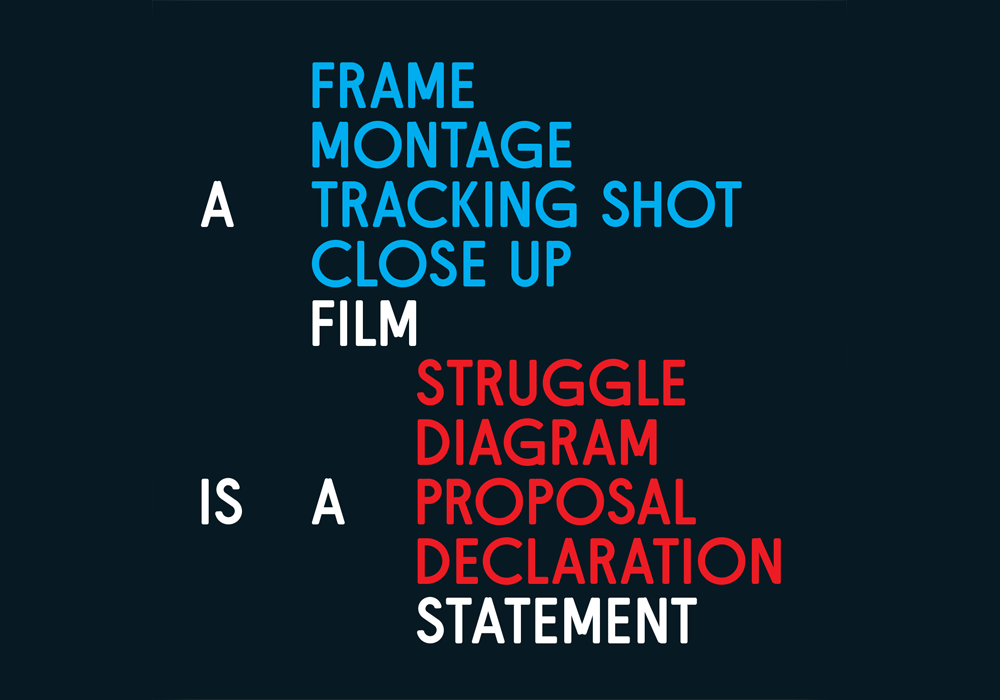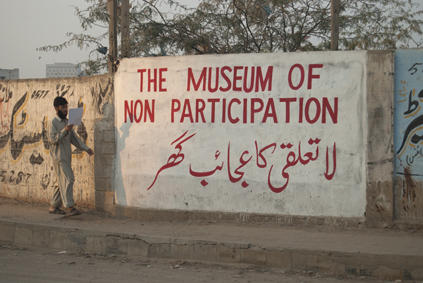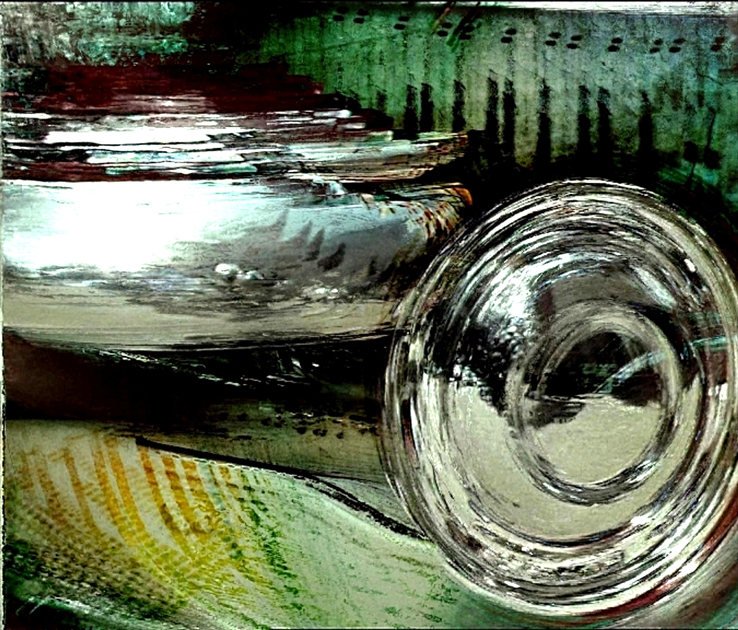
A Film is a Statement
Every aspect of every film is always about more than just film.
What we said about it at the time: A Film is a Statement is an open, convivial sort of screening/performance/ ideas hybrid – a cross between a festival, magazine and discussion about experimental artists’ films. Everything will be introduced by the filmmaker, or artist, or a critic or someone who will talk about it. And it’s meant to be informed, but informal: there will be plenty of room for just hanging out, chatting, generally thinking together. The festival programme includes world leading radical moving image artists, some of the most important political filmmakers of the last 50 years, activists and leading philosophers.
ReadEvery aspect of film is always about more than just film
0.
Exposition
This is a festival of experimental, artists’ film 1 . It concerns film as a way of thinking 2 (about the world). It may end up being: a series of variously interesting, intense, challenging, thoughtful events; a kind of convivial social space.
1.
“Why, sometimes, do images begin to tremble?”
There’s a sequence in Chris Marker’s film A Grin Without a Cat that intercuts a series of blurred and jittery images shot during May ’68 in Paris, with the words “Why, sometimes, do images begin to tremble?” Later, we learn that the hands of the camera operators were unconsciously shaking: they produced wavering images as a direct index of the feelings provoked by a momentous episode in history 3
2.
“We must make films politically”
The first two lines of Jean-Luc Godard’s 1970 manifesto What is to be done? state:
1. We must make political films.
2. We must make films politically.
It goes on: these ways of making film are at odds with each other. Point 1 – idealistic; point 2 – truly, committedly political 4 . So really: what needs to be done is for artists to make films in which every decision they take (how and what to shoot, how to edit, how to collaborate, how and where to screen…) is informed by, or informs their political, philosophical position. Or, more succinctly: “a tracking shot is a moral issue”.
3.
“The political film isn’t simply a teaching film. It shows us the learning process itself.” 5
And that’s the difference, right? Journalism points out something about the world, and that’s useful. But an artist also has the responsibility of thinking about how things are pointed out, and why; of thinking about what is revealed (consciously for Godard, or subconsciously in those unsteady shots of May 68’ in Marker’s film) in the way images are made. Art can be a process where we don’t pretend to know everything, but do take decisions about how we want to learn.
4.
A Film is a Statement
So in being about all of the above: this is a cross between a festival, magazine and discussion about experimental, artists’ films. Some of the films might not look like films (they might be more like performances, or lectures, or books, or databases). Some things might ask you to think about what a film is, or what it is for. All of them, in interesting ways, point to ideas much bigger than film, while dealing with very real subjects filmically. Everything will be introduced: by the filmmaker, or artist, or a critic or someone who will talk about it, very often with you. And it’s meant to be informed, but informal: there will be plenty of room for just hanging out, chatting, generally thinking together.
The Episode was reviewed by Neil Cooper for The Herald and for Sight and Sound by Chris Fujiwara
- For expediency’s sake, we’re just going to be saying ‘film’, if that’s OK, as a kind of shorthand to also include: artists’ moving image, art-house cinema, experimental film, video making…etc and so on..and which could easily also be used to describe different parts of the festival.
- Maybe you could say: film is a kind of non-discursive thought, or: film can produce a kind of cognitive experience…
- As well as the film, you’re hereby invited to check out Chris Marker: Memories of the Future by Catherine Lupton, which we were (obviously) skimming and lifting from while thinking about what to write here.
- Unquestionably, it’s more complicated than that; we’re short on space. Read the whole thing.
- Be apprised, we don’t often come up with such well-turned concepts ourselves; that’s a quote from Dmitry Vilensky from Chto Delat?. Here’s the whole essay.
Programme Events

An introductory salon
Hartmut Bitomsky
Hartmut led “a workshop in the old-fashioned way of discussion, mutual exploration of ideas and samples; trying out what can be shared and where the fault lines show.”

The Museum of Non-Participation
Brad Butler Karen Mirza Nabil Ahmed
This performance brings together film, text and speech and temporarily constructs a filmic space to think through questions of resistance, and the choice and consequence of action vs. inaction: what does it mean to choose to not take part?

Kino Beleske (Film Notes)
Lutz Becker
Recently rediscovered but still very pertinent, Kino Beleške presents a series of speech acts and performative gestures by protagonists of the new artistic practice in former Yugoslavia: each a personal take on the role of art in society.

Argument
Andrew Tyndall Anthony McCall
Argument is a provocative, multi-layered film essay, a trenchant analysis of the media and remains a critically relevant and critically inflammatory tract.

Argument – We would argue: an ante/post discussion group
Gil Leung Ian White
Ian and Gil will host a discussion on the Argument project’s social and political commentaries, and with you try and maybe think through whether and how they might still have some currency today: what’s changed and what’s stayed the same?

Nina Power discussing November
Hito Steyerl Nina Power
Nina’s going to talk about November, by Hito Steyerl: what and how the film thinks, or about what and how it might makes us think (which is connected, but not the same thing), by watching, and it discussing (with you?).

Aluminium: Beauty, Incorruptibility, Lightness and Abundance, the Metal of the Future
Graham Harwood
Taking The Futurist Cinema’ manifesto and turning it into software to track ‘aluminium’ online, tracing relationships companies with interests in aluminum had to each other and other agencies.

Ayreen Anastas & Rene Gabri
Ayreen Anastas Rene Gabri
An open-ended moment in an ongoing series of films, notes, performances, diagrams and drawings which trace the questions they share. A “porous space between cinema time-space and lived time-space.”

Data as Documentary: Graham Harwood
Graham Harwood
Databases carry the same seeds of creativity that early documentary makers saw in film. Both can empower people by helping them to master information, both can be claimed to represent some kind of reality or truth.

B-52
Hartmut Bitomsky
Hartmut is going to talk a little about his work at large and the politics of how his films are constructed. And we’ll screen one of his best films: B-52.

Too Soon, Too Late
Opening with one of the most memorable shots ever filmed, and screened a year after the initial successes of the 2011 Egyptian revolution, Too Soon, Too Late is a search for the traces left on the landscape of past revolutions in France and Egypt.

The Songspiels of Chto Delat?
Chto Delat
The Songspiels take on a mode of musical theatre developed by playwright Bertolt Brecht and composer Kurt Weill in the early twentieth century, presenting political and social concerns through the accessible and (often funny) form of song.